Top 6 Mobile App Development Frameworks in 2022
Posted on March 21, 2024 at 04:13 PM

Introduction
No matter how old a person is, it is safe to say that almost everyone is dependent on mobile apps in today’s era. If you are hungry, you just take out your food and order food via GrubHub, Ubereats, etc. You can order groceries via grocery delivery apps if you are not looking for restaurant food. Apart from ordering stuff online, you can book a cab or doctor’s appointment or even get a consultation via on-demand apps. Thus, treading into this industry of developing and launching apps can benefit a company whose primary business is offering day-to-day services to people.
A person on average spends 4.8 hours on apps daily, and the number of global mobile app users witnessed a boom in 2020, advancing by 2-3 years in 12 months and is currently around 7 billion. Also, the App Annie State of Mobile 2022 reveals a 5% YoY in new app downloads. This data speaks volumes about why making your services available online via mobile apps is beneficial! You get to reach a significant number of people. But one thing that might perplex you is how to develop mobile apps without complex programming languages.
You do not need to scratch your head; we tell you how you can go about mobile app development without complex coding. So, the answer is a mobile app development framework! Although several mobile app development frameworks are available, few offer good services. This blog informs you of the Top 6 Mobile App Development Frameworks in 2022.
Mobile App Development: What is a Framework?
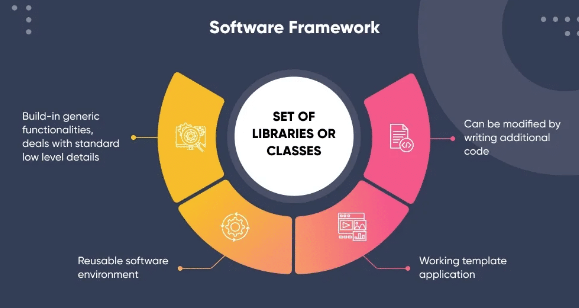
- Software
- Compilers
- Programming Interfaces
- Debugging tools
Developers select one mobile app development framework that helps them create apps for specific ecosystems and devices.
What are the Benefits of Mobile Development?
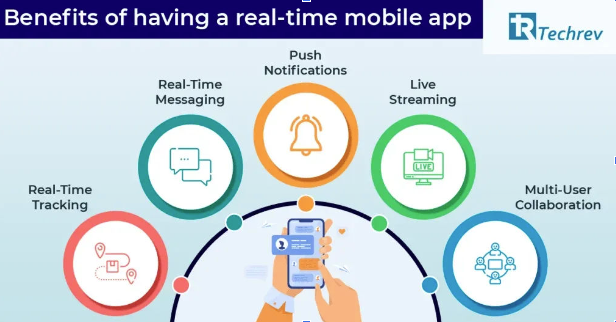
Today, everyone loves using mobile apps to help us manage schedules, increase productivity, get entertained, etc. The only reason that promoted the usage of mobile apps is that they are user-friendly, quick, and made to suit specific expectations. It will be better to have a glance at the following benefits of mobile app development:
Boosts Customer Engagement
Creating customized business apps helps one build a direct channel between enterprises and customers, enabling direct and effective communication.
Enhances Efficiency
Every bespoke business app aims to execute diverse functions and enhance employee productivity, thus increasing business investment returns.

Furnish More Value to Customers
Launching a customer-loyalty program within your mobile apps enables your customers to obtain their loyalty points or rewards through their apps. Hence, they no longer need to use the traditional collection card method. This move results in more app downloads and returning/ loyal customers.
Generate Brand Awareness and Recognition
You can use mobile apps to exhibit what your brand stands for and strengthen your brand and educate people on what your brand truly is. The more people you can get more engaged in your app, the more they will trust your brand and go to you.
Boost Profits
The one thing that businesses should know is that it will be better to keep costs low while developing mobile apps for business purposes. You can boost sales by launching a mobile app and a responsive brand website and simultaneously enhance customer experience. Also, mobile apps promote more purchases as they are easy to use.
Top 6 Mobile App Development Frameworks in 2022
1. Flutter

Google has launched the Flutter UI framework to develop native mobile apps. Established in 2017, it is flourishing and relatively new and has a plus point. The plus point to Flutter is its single codebase, which enables developers to create mobile apps for Android and iOS simultaneously. Thus, this free and open-source framework makes the development process swift and uncomplicated. For the unversed, flutter mobile app development comprises a software development kit, also known as SDK, besides a widget-based User Interface Library.
These native widgets of Flutter minimize the time spent on testing because of the lack of compatibility issues. Moreover, one can quickly become skilled at using Flutter. Thus, many companies are embracing this mobile app development framework because it is a cross-platform framework that increases productivity because of the same codebase for Android and iOS. The same codebase facility helps one save time spent on developing apps.
Therefore, if you want to build native apps without accessing OEM widgets or much code, you can use Flutter. A few apps that use Flutter are:
- iRobot
- Groupon
- Bytedance
- Alibaba
- Google Ads
- GooglePay
- Baidu
- Kotak
- Square
2. React Native
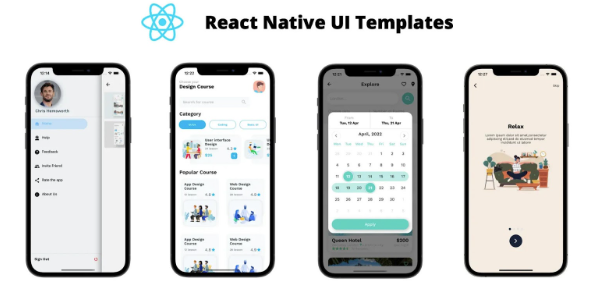
The second mobile app development framework on this list is React Native. It is an open-source framework for developing native mobile apps using JavaScript. React Native is a best-in-class JavaScript library for developing interfaces because it is in tandem with React. Also, it lets you create platform-specific versions of various components with the help of a single codebase across multiple platforms. Let us look at some of the features of React Native, a mobile app development framework from Facebook launched in 2018.
- Compatible third-party plugins
- It supports Android and iOS
- Low code
- Declarative API for predictive User Interface
Popular apps using React Native are as follows:
- Skype
- Uber Eats
- Flipkart
- Bloomberg
- Wix
And many more.
3. Kotlin
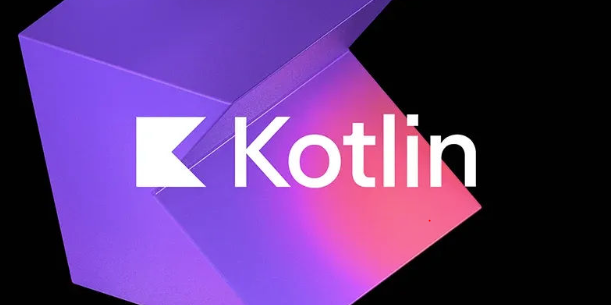
The third mobile app development framework on the list is Kotlin. A few words that one uses to describe Kotlin are Feature-rich, flawless Java interoperability, and extremely popular. Kotlin is a server-side application development framework and is the brainchild of JetBrains.
They are currently working on embedding systems and iOS to make Kotlin a one-stop language in every app area. Kotlin offers a clean language design, powerful features, high readability, no runtime overhead, and fewer bugs, allowing one to write less code. We list a few popular apps built using Kotlin below:
- Uber
- Tinder
- Coursera
- Trello
- Evernote
- Slack
- Corda
4. Xamarin

The fourth mobile app development framework on the list is Xamarin. Xamarin is a robust cross-platform app development framework with C# and .NET as its technology stack. Developers who use Xamarin can reuse the maximum code for iOS and Android.
Moreover, developers can create an app’s user interface using the Model pattern as Xamarin uses MVC design patterns. Also, it lets developers see which parts of their apps use a native user interface for each of the following platforms:
- iOS
- Android
- Windows
- Mac
Besides these facilities, Xamarin helps you get a productive and high-performing code. Using this mobile app development platform means you do not need to develop different APIs for iOS and Android. Hence, you can use the same API to build apps on iOS and Android. If you want to use Xamarin, go for it without hesitation, as this mobile app development framework has enormous support and community.
Thus, you can use Xamarin if you are someone who wants to integrate various Software development kits using different operating systems. Also, you can now use your code multiple times with the help of its shared code base. Undoubtedly, using Xamarin reduces one-third of one’s time and effort. We list a few popular apps created using Xamarin below:
- Insightly
- Olo
- FreshDirect
- The world bank
- Storyo
- Skulls of the Shogun And many more.
5. Swiftic
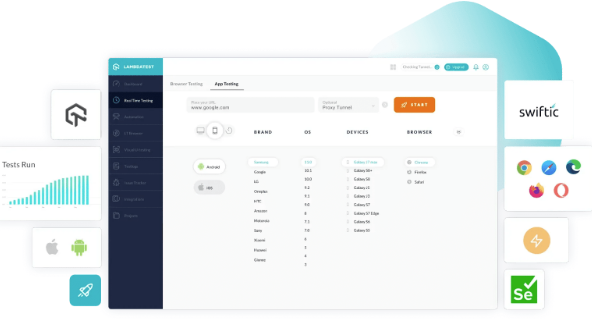
The fifth mobile app development framework on this list is Swiftic, which is available on the iOS platform and features an utterly navigable interface. Those who want to try this mobile app development framework can do so easily. Swiftic offers a thirty-day money-back guarantee option for every plan it offers.
Besides this option, one more guarantee scheme is available, a six-month success guarantee scheme. Even this plan is free, and you find the results using it. We list a few features of Swiftic below for you to make a sound decision:
- App promotion
- Third-party integration
- Advanced Analytics
- Interesting push notifications
- In-app coupons
- Develop your mobile store
- Become a loyal shopper with a loyalty card
- Menu and ordering
- Use scratch cards to grab prizes
- Social & Media Feeds 11.Easy Communication
- App Publication Assistance
- Customer Engagement
Popular apps built using this mobile app development framework are as follows:
- Slack
- Uber
- Lyft
- Accenture
- Khan academy
6. Ionic
![]()
The sixth mobile app development framework on the list is Ionic, which helps one develop interactive hybrid and progressive web applications besides cross-platform applications. Ionic is an open-source framework that offers premium services for you to develop applications. With Ionic, you can create apps for the web, Android, and iOS and constantly ship them to the deployable locations.
Also, there is a powerful lightning version of Ionic called Studio, which you can install locally to have a simple visual development environment. Ionic is an ideal mobile app development framework with out-of-box features, making it the best of all available mobile app development frameworks.
We list a few features of this mobile app development framework below for you to make a sound decision:
- Complete control over app building
- Powerful and stable development platform
- Intuitive User interface components
- Evergreen community of 5 million developers
- Faster development time
Conclusion
If you want to launch an on-demand service business, it will be better to embellish your business with a mobile app. A mobile app helps you reach more customers and make them loyal to your services by starting various loyalty programs to lure and retain them.
The best thing about mobile app development today is that you no longer require complex coding to develop marvelous mobile apps. This blog has mentioned the top 6 Mobile App Development Frameworks in 2022 that will help you develop mobile apps without hassles.
If you want more help than what a mobile app development framework provides, contact AppsRhino immediately to get a mobile app that will take the world by storm.
Related Posts
We could talk tech all day. But we’d like to do things too,
like everything we’ve been promising out here.
